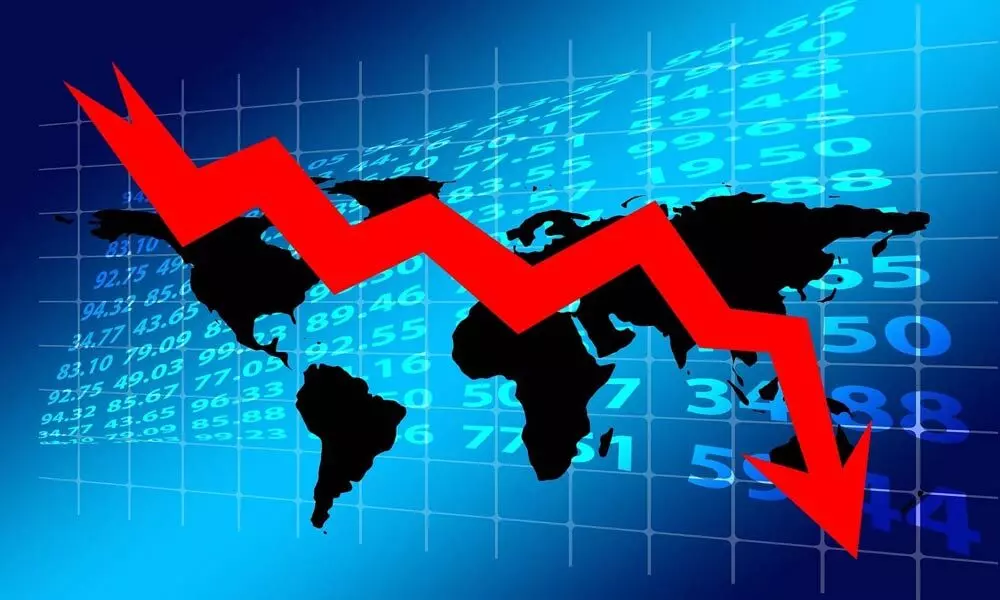Pandemic may trigger biggest recession since world war-II
Financial loss is expected to be a staggering $12 trn, twice as great as during the 2008 recession, over 2020 and 2021; While no economy is left untouched, lower and middle-income countries are worst affected because they have weak defences against economic shocks
image for illustrative purpose

As lockdowns begin to ease all over the world, it's a good time to look at the cost of lockdowns, in terms of value, jobs and loss of life. India is among the countries hardest hit by in the second wave of the Covid-19 pandemic - not only in terms of human life, but also economically.
The pandemic will likely trigger the biggest recession since world war-II, causing a financial loss twice as great as during the 2008 recession. That's a staggering $12 trillion the global economy will lose over 2020 and 2021.
While no economy is left untouched, lower and middle-income countries are worst affected because they have weak defences against economic shocks and tend to depend more on a few sectors, such as commodities and tourism.
Millions of people have already fallen below the poverty line. In just a few months of Covid-19, extreme poverty went up for the first time in 20 years. Wealthy countries have had the means to intervene early to protect people and businesses, by pumping $9.8 trillion into their economies, the biggest chunk of the total of $11.7 trillion spent globally, to cope with the fallout from the pandemic. But low- and middle-income countries have not been able to do the same.
A report by Oxfam reviewed the government measures to support people through the pandemic in 126 low and middle-income countries, including numerous kinds of benefits for those affected, and found that 97 per cent of the support provided was inadequate to meet basic needs.
Without tangible solutions to stop the virus from spreading and treat those who fall ill, the pandemic will continue to steal lives and livelihoods. The greatest investment we could make now is in the research, development and fair distribution of tests, vaccines and treatments.
The good news is that the investment needed – $16.8 billion this year, as estimated by the ACT-Accelerator – is small compared to what the world will keep losing if we don't act. For every month's delay in expanding access to Covid-19 vaccines, tests and treatments equitably around the world, the world is losing 1,20,000 lives and $460 billion in economic output, the International Monetary Fund estimates.
Micro, Small and Medium Enterprises (MSMEs) in India have seen an average 11 per cent decline in business volume due to lockdowns in 2021, compared to 46 per cent during the 2020 nationwide lockdown, said a survey conducted by fintech start-up Khatabook.
The year 2020 was unprecedented, impacting every aspect of the economy. In fact, sectors like travel and hospitality, real estate, suffered immensely. Startups with almost negligible reserves, were hardest hit, facing challenges such as layoffs, funding crunches, paused operations.
On the flip side, India saw massive growth in sectors like healthcare, biotech, edtech, fintech, online gaming, and OTT. Several ground-breaking innovations using cutting-edge technologies changed the traditional healthcare industry. The country not only saw the emergence of e-pharmacy, and telemedicine, these instantly found widespread acceptance among consumers. Therefore, e-health and healthtech startups soon expanded their reach. In fact, in the years to come, the healthcare market is set to grow at a CAGR of 17 per cent and reach a market valuation of $353 billion by 2025. With this potential, it is estimated that e-health currently has an addressable market of $11 billion, out of which only 11 per cent is tapped.
International Labour Organization (ILO) predicted that 25 million jobs were threatened by the new coronavirus. Before Covid-19 spread worldwide - global unemployment already stood at around 190 million.
Workers in four sectors that have experienced the most 'drastic' effects of the disease and falling production are: food and accommodation (144 million workers), retail and wholesale (482 million); business services and administration (157 million); and manufacturing (463 million).

